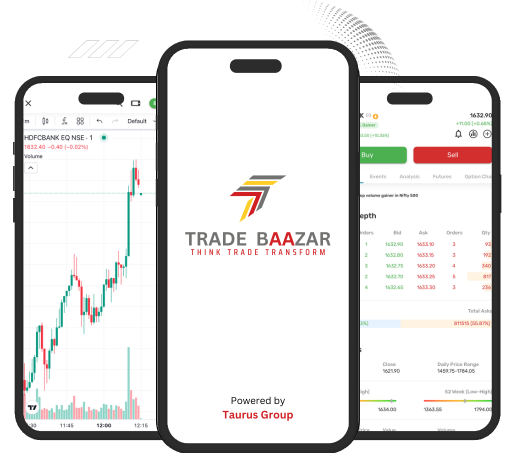- Bond IPO, Debenture
IPO - Money market instrument placements
- Equity IPO, Mainboard IPO
- Start-up, SME IPO
- Rights Issue
- Buy Back
- FPO / OFS
- Underwriting
- Delisting
- Block Placement
- Company Valuations
- M&A advisory
Raise capital, Grow to higher levels, Choose Taurus as your Merchant Banker .
Debt/ Equity
Right balance in Capital structure
5+
Equity IPO’s
500+
Bond issuances.

What is Investment banking ?
Investment Banking is a financial service that assists companies, governments, and institutions in raising capital, offering strategic advisory services for mergers and acquisitions, and managing complex financial transactions. It bridges investors with entities seeking funding, providing tailored financial solutions for their capital structure.
Why choose
investment banking
with Taurus ?
When is Investment banking done ?

Capital Formation
Investment banking is done when a company needs to raise capital through debt or equity. Thus the company chooses to go for IPOs, private placements, and issuances of bonds.

Mergers and acquisitions (M&A)
Investment bankers help companies evaluate potential targets, conduct due diligence, and negotiate terms for M&A.

Research
Investment banks have research divisions that review companies and write reports about their prospects, often with buy, hold, or sell ratings.

Investment Banking Services
Trust our multi award winning services
Request A Call Back
Simplify your investment journey with our platforms
Simplify your investment journey with our platforms, crafted to offer a smooth process and rewarding results.

Enjoy real-time market updates, latest features and a seamless trading experience.

Comprehensive portfolio view and analysis for effective investment management.

Advanced charting tools for in-depth market analysis.

User-friendly interface for quick and easy trading.

Testimonials
What our happy client say.
As a process transformation company, we rethinks and rebuilds processes for the digital
FAQS
Bonds are debt securities issued by governments, corporations, or other entities to raise capital. When you buy a bond, you are essentially making a loan to the issuer for the principal when the regular interest payments mature (known as coupons) Bonds have a fixed term, after which they mature and the donor actually pays.
Bonds are ideal for individuals looking for stable, low-risk investments. Investors who prioritize preserving their capital while earning regular interest income, such as retirees or those nearing retirement, should consider bonds. Additionally, bonds can be a good choice for anyone seeking to diversify their portfolio and balance riskier assets like stocks. Bonds offer predictable returns and are often seen as safer investments during times of market volatility.
Bonds may offer higher returns than fixed deposits, especially for long-term investments. Unlike fixed deposits, bonds can also provide the opportunity for capital appreciation if market interest rates fall, increasing the bond’s value. Additionally, bonds often have more flexibility, with a variety of types (government, corporate, municipal) and maturities, allowing investors to choose based on their risk tolerance and financial goals. While both bonds and fixed deposits provide a steady income stream, bonds typically offer better potential for growth and portfolio diversification
Bonds offer several advantages over other investment options. First, they provide consistent and predictable income through regular interest payments, making them ideal for conservative investors or those seeking a steady cash flow. Second, bonds are generally lower-risk compared to stocks, offering more stability, especially during market volatility. Bonds also act as a hedge against stock market fluctuations, helping to diversify a portfolio. Additionally, certain bonds, like government bonds, are considered very safe investments, offering security with minimal risk to your capital.
Government Bonds: Issued by governments to fund operations, these are considered low-risk and provide stable returns. Example Municipal bonds
Corporate Bonds: Issued by companies to raise capital. These bonds typically offer higher interest rates than government bonds but come with higher risk, depending on the company's credit rating
Municipal Bonds: Issued by local governments or municipalities. Interest earned is often tax-exempt, making them attractive for investors in higher tax brackets.
Convertible Bonds: These can be converted into a specific number of shares of the issuing company, offering potential for capital appreciation along with fixed income.
High-Yield (Junk) Bonds: These offer higher returns but come with higher risk, typically issued by companies with lower credit ratings.
Each type of bond caters to different risk tolerances and investment goals.
Yes, certain bonds offer tax-saving benefits, making them attractive to investors looking for tax-efficient investment options.
Municipal Bonds: In many countries, interest earned on municipal bonds is often exempt from federal and sometimes state taxes, making them a popular choice for tax-conscious investors.
Tax-Free Bonds: Issued by government organizations, the interest income on tax-free bonds is exempt from taxation. These are typically long-term investments with lower risk.
Government Savings Bonds: Some government bonds, such as Sovereign Gold Bonds or Infrastructure Bonds, may offer tax benefits under specific sections of the income tax laws, providing either exemptions or deductions on interest earned.
Yes, while bonds are generally considered safer than stocks, they are not risk-free. Some potential risks in bond investments include:
Interest Rate Risk: Bond prices typically fall when interest rates rise, which can lead to capital loss if you need to sell before maturity.
Credit Risk: If the issuer of a bond defaults or experiences financial difficulty, you may not receive interest payments or your principal back, especially with corporate or junk bonds.
Inflation Risk: The fixed interest payments from bonds may lose purchasing power if inflation rises, eroding the real return on your investment.
Liquidity Risk: Some bonds may be difficult to sell quickly without affecting their price, particularly in less liquid markets or during economic downturns.
Bonds typically do not have a lock-in period like some fixed deposits or savings schemes. However, they do have a maturity period, which is the date when the bond's principal amount is repaid to the investor. You can sell most bonds before maturity in the secondary market, but their price may fluctuate depending on market conditions. That said, certain bonds like tax-saving bonds or government savings bonds may have specific lock-in periods, during which you cannot redeem the bond. Always check the terms and conditions of the bond before investing to understand its liquidity and redemption options.
Yes, in most cases, you can sell your bonds before maturity in the secondary market. However, the price you receive may vary based on market conditions, interest rates, and the bond's credit rating. Selling before maturity could result in a capital gain or loss, depending on the bond's current market value compared to the price you initially paid. Keep in mind that some bonds, such as tax-saving bonds or government savings bonds, may have restrictions or penalties for early withdrawal. It's important to review the specific bond terms to understand your liquidity options before investing.





